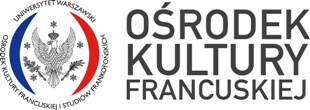Wtorek geopolityczny 5/04/2022

Ośrodek Kultury Francuskiej i Studiów Frankofońskich UW, Wydział Nauk Politycznych i Studiów Międzynarodowych UW oraz Polskie Towarzystwo Studiów Międzynarodowych we współpracy z Groupe d’études géopolitiques zapraszają na spotkanie z cyklu WTORKI GEOPOLITYCZNE.
The Future of Central and Eastern Europe
Dyskusja z okazji publikacji książki „Contested Legacies of 1989. Geopolitics, Memories and Societies in Central and Eastern Europe” pod redakcją Nicolasa Maslowskiego i Kingi Torbickiej
Nicolas Maslowski (OKFiSF UW)
Anaïs Marin (OKFiSF UW)
Sabine Volk (Uniwersytet Helsiński)
Pierre-Frédéric Weber (Uniwersytet Szczeciński)
5.04.2022 wtorek
godz. 15.00-16.30
WYDARZENIE W FORMIE HYBRYDOWEJ
Sala nr 210, ul. Nowy Świat 69
On-line : https://us02web.zoom.us/j/84616059496
Spotkanie w języku angielskim.
Informujemy, że spotkanie jest rejestrowane. Nagranie będzie wykorzystane w celach naukowych. Udział w spotkaniu jest równoznaczny z wyrażeniem zgody.
Nicolas Maslowski & Kinga Torbicka (eds.), Contested Legacies of 1989. Geopolitics, Memories and Societies in Central and Eastern Europe, coll. Studies in Sociology: Symbols, Theory and Society, vol. 12, Peter Lang, Berlin 2022.
Strongly affected by modern history and facing dilemmas of modernity, Central and Eastern Europe has been healing fresh wounds for the past 30 years. The present volume analyzes the contemporary challenges related to the heritage of 1989. The peaceful revolution brought substantial socio-cultural, institutional and strategic transformations, setting a long-term course for Central and East-ern European policymaking. Recently, however, these legacies, namely the geopolitical aspects of the transformation, the policies of collective memory, and even intrasocietal issues, have been questioned more than ever. It seems the region is approaching the end of a revolutionary cycle of transition. This volume tries to investigate this phenomenon as it unfolds.
Nicolas Maslowski
Currently director of the CCFEF, a French Polish center in social sciences created by Michel Foucault in 1958 at the University of Warsaw, Nicolas Maslowski, PhD is a political scientist and sociologist At present directing the 4EU+ program “European Pluralities” (Sorbonne University, Heidelberg University, University of Copenhagen, University of Warsaw, Charles University, University of Milan) He studied in the Institute of Political Sciences Paris, University of la Défense-Nanterre, University of Nancy II, University of Paris South His interests include historical sociology, Central and Eastern Europe, Collective Memory, European politics, International Relations, Francophone Afrika, protests He worked previ- ously in various places, as at Charles University in Prague, or in EHESS- Paris Former Fellow of the Collegium Budapest, of the CEFRES in Prague.
Anaïs Marin
French political scientist specialized in international relations, Eurasian, and border studies Her cur-rent research, funded by a three-year OPUS 220 Contributors grant from Poland’s National Science Centre (NCN), focuses on Russia’s “sharp power” strategies towards its Western European neighbors and their percolating effect on democratic values and EU institutions Dr Marin previously analyzed the “dictaplomacy” of authoritarian post- Soviet Eurasian regimes, in the framework of a Marie Curie fellowship As a Belarus expert, she has worked with several think tanks, such as the Finnish Institute of International Affairs (FIIA, Helsinki), the EU Institute for Security Studies (EUISS, Paris) and recently Chatham House (London), of which she is an Associate Fellow She contributed policy papers and recommendations to various EU governments and institutions, while also regularly tak-ing part in OSCE/ODIHR election observation missions in the region Since November 2018 she holds the pro bono mandate of UN Special Rapporteur on the situation of human rights in Belarus.
Sabine Volk
Graduate Candidate at the Jagiellonian University in Kraków and a Marie Sklodowska-Curie Fellow within the project Delayed transformational fatigue in Central and Eastern Europe: “Responding to the rise of illiberalism/populism (FATIGUE)” Her dissertation under the working title of “Shifting memories of 1989/1990: The re-performance of the “Peaceful Revolution” by PEGIDA in Dresden” is jointly supervised by Professor Zdzisław Mach and Dr Krzysztof Kowalski and focuses on the poli-tics of memory in the post-socialist city She received two Master’s degrees in interdisciplinary Euro-pean Studies from the Erasmus Mundus Programme Euroculture at the Universities of Groningen and Strasbourg and from the College of Europe (Natolin), which focused on European history and civilization.
Pierre-Frédéric Weber
PhD in German and European Studies at the Universities of Angers and Paris III –Sorbonne Nouvelle Dissertation on German-Polish relations in the 1960s and early 1970s, published as Le triangle RFA- RDA-Pologne (1961–1975): guerre froide et normalisation des rapports germano-polonais, Paris, L’Harmattan 2007 Currently Visiting Professor at the University of Szczecin Re-search fields: history of twentieth-century international relations in Europe; Central and Eastern European History; post-war processes between Germany and its Eastern neighbors; the role of emotions in international relations Latest publication on the fear of Germany in Europe since 1945: Timor Teutonorum: Angst vor Deutschland seit 1945. Eine europäische Emotion im Wandel.